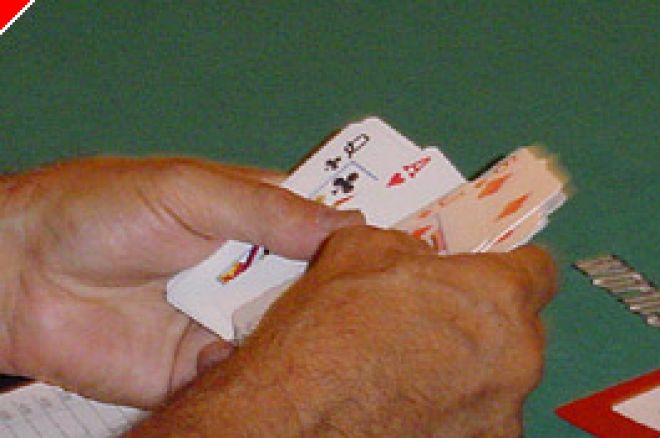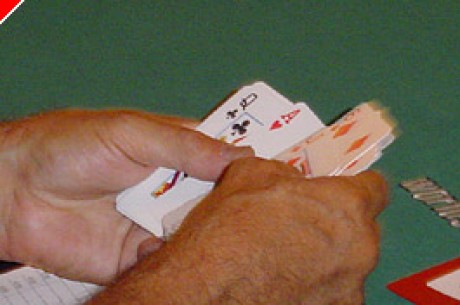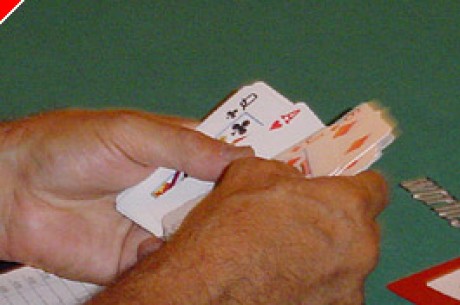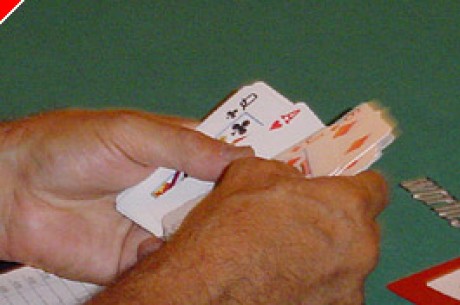Stud Poker Strategy - Playing Pairs on Fourth Street

In a prior poker column I addressed playing low and medium pairs on third street. I mentioned that they could be the source of some extra profit or significant loss if you didn't get away from them correctly. I'd like to look now at play on Fourth Street with those same cards.
I am writing a general strategy here, suited best for games with novice or intermediate players. In tougher games, with a bunch of better players, a successful strategy must vary – based on your read of their playing style, their likely hands and your read of how they read you. But for now, when you are in games with relatively unskilled opponents, you need a more straightforward mechanical style of play. This is that style.
Let's look first at low or medium pair hands that improve by catching a third card of the paired rank. A pair of 7s, for example, makes trip 7s. This can happen in two ways: either a wired pair or a split pair can become trips. The wired pair is simpler. Let's look at it first.
If your wired pair makes trips on fourth street then your opponent will not know it. He'll see two unpaired up cards. Don't slowplay this hand – though some players mistakenly do so automatically. Bet and raise aggressively – trying to get as much money in the pot as possible. Though your more observant opponents may suspect that you made some kind of a hand, few if any will have the combination of good hand reading and discipline to fold their hands. Make them pay to continue with their hand.
The more interesting situation is when you pair your other upcard, having started with a split pair and now getting trips. You have the option of making a small bet or a large bet. In limit stud, typically, when there is an exposed pair on Fourth Street you can bet or raise either the lower bet or the higher bet. If the game is $10/20 for example you can either bet $10 or $20 on Fourth Street with an exposed pair.
Some players like to try to lure callers by betting the lower tier bet. Suckers, they reason, can't resist a bargain. I generally discourage this strategy. For one, against even mildly sophisticated opponents it's apt to make players more suspicious, as the standard bet is the higher tier bet. "Why is he betting the lower tier" they tend to ask. "He must be loaded," they conclude.
Another advantage to making the larger bet is that players who call you on fourth street will be more likely to call you on future streets, concluding wrongly that they are now committed to the hand and need to call you down to the River. The more money they put in the pot this early, the more committed they feel. Your large fourth street bet turns the pot into more of a magnet for those who tend to be sucked in by such things. You also increase the size of the pot you expect, as the heavy favorite, to win.
What if your fourth street card doesn't give you trips? Unless I pair a premium kicker, making a premium two pair (in which case I play it just as I would play a premium two pair that started as a premium pair) I tend to check. True, there are some tricky moves that can work against observant opponents. But I'm talking about most of the time against middling or poor opponents. And most of the time, if my opponents are anything but rocks or I have anything but the tightest of images, I tend to check – even with a paired door card that gives me two low pair.
Your small two pair is unlikely to hold up unimproved in a multi-way race. Your bet is unlikely to scare away most players. And the better players may well think you are slowplaying trips when you check a paired board – making them reluctant to bet into you even when you check.
Sometimes you start on third street with a split low pair and a high kicker like an Ace or a King. What do you do if you pair your kicker? If that's the case, whether the high card is hidden or exposed, I bet and raise aggressively. While Aces up or Kings up is a strong hand, it's not strong enough to play slowly – letting opponents get another card cheaply or for free. So it makes sense to make them pay to see another card or fold.
The above not withstanding, most of the time, when you start with a pair, your fourth street card won't help you at all. It will be a blank. (For those of you mathematically inclined the ratio of helpful to unhelpful cards is roughly 9:1 against you). With very few exceptions involving scare cards that don't really help but appear as if they might, I recommend a passive approach if your hand doesn't really improve. As much as many emphasize the importance of bluffing and deception, the key to winning poker among beginning and intermediate players is to save money when you are behind.
If your low pair doesn't improve, fourth street is the time to fold to any bet that you credit as truly indicating strength. Of course you can check along if no one else bets, getting a free card if possible. But if an opponent bets into you, and you are fairly certain that he has you beat, don't get tricky or cute. Fold and wait for a better opportunity in the future. I include those times when you make a 3-Straight or 3-Flush on your fourth card. True, it has a slightly better future than a low pair with no Straight or Flush possibilities. But, generally speaking, it's still not worth calling. So, most of the time fold it and save your money for another hand.
Again, there are exceptions to these rules – especially if you are playing against opponents who do not play straightforwardly and who will credit your "moves" and respond accordingly. I will cover those exceptions in another column. But for now, learn to play it straight as I've indicated above.
Ed Note: Play it straight against some of the best in the world at Full Tilt Check it out.








